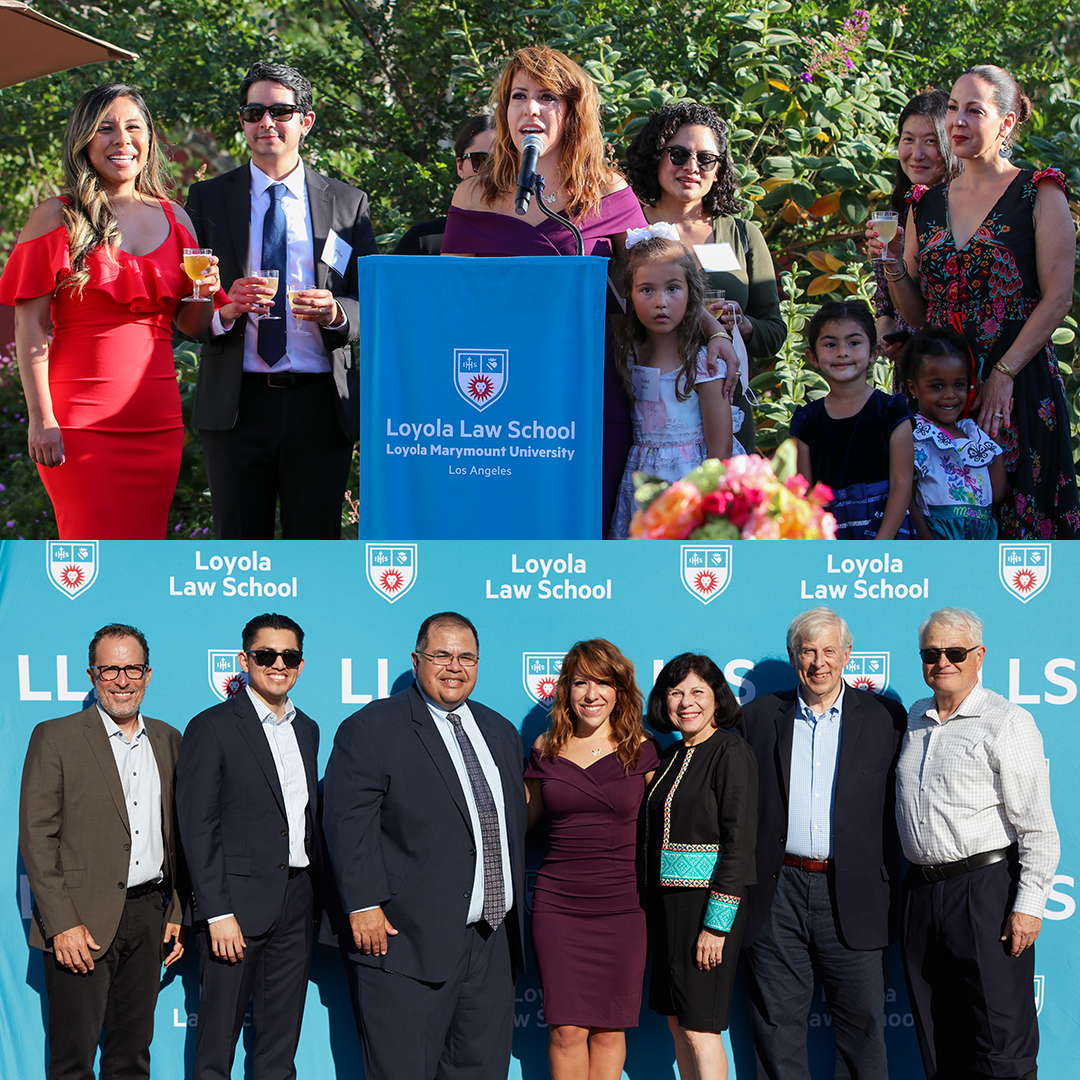Loyola Immigrant Justice Clinic Celebrates 10 Years of Service

“This is a celebration not for us to gain recognition but for us to express gratitude – gratitude to the immigrant community that has embraced us,” said Marissa Montes ’12 in front of more than 200 guests gathered on the LMU Loyola Law School campus on June 6 to celebrate the 10th anniversary of the Loyola Immigrant Justice Clinic (LIJC), the first community-based immigration clinic housed at a law school.
Clients, students, alumni and supporters of LIJC were joined at the celebration by dozens of immigration law professors from around the country who were on campus to attend the Immigration Law & Teachers Conference. The LIJC’s 10th coincided with the 10th anniversary of the Deferred Action for Childhood Arrivals (DACA) legislation. In that spirit, the event also celebrated DACA-mented LIJC students and alumni: Daniel Barragan ‘21, Yurie Blons ‘23, Marco Castellon Florez ‘20, Genine Cumba ‘20, Orion Hall ‘16, Nasim Khansarai ’17 and Kenny Ramirez ’14.
“I want to acknowledge that the LIJC team truly does represent who we are and who we hope to be at Loyola Law School,” Dean Michael Waterstone told the crowd. “You all share significant ties with the communities that you serve. Collectively you tell a compelling story of drive and leadership that began when many of you were students here.”
LIJC’s dual-pronged mission is to advance the rights of East Los Angeles’s immigrant population through direct legal services, education and community empowerment, while teaching law students effective legal skills and ethics in a real-world setting. Since its inception, the LIJC has served close to 15,000 noncitizen clients and trained more than 100 clinical law students. Over the last 10 years, clinic attorneys and students have helped conduct more than 10,000 client consultations, largely via community partners Homeboy Industries and the Dolores Mission. It is one of the 20-plus clinics that comprise the Loyola Social Justice Law Clinic.
“Our work at LIJC is how we honor our immigrant families who have paved the way for us,” said Montes, who took particular note of the clinic’s work on behalf of clients with DACA issues. “We now have the opportunity to lift the voices of our community and empower them to reclaim their space and open doors to the future generations.”
The event also debuted the Loyola Immigrant Justice Clinic Community Impact Awards, named for the initial members of the LIJC Founders Circle. Inaugural honorees included Dolores Mission, which received the Jack Girardi Community Impact Award (award accepted by Father Scott Santarosa); Mexican American Bar Association (MABA), on whose behalf Heriberto Veliz ‘16, MABA president, accepted the Maria Villa Community Impact Award; Homeboy Industries, which received the Nick Daum & Daum Family Foundation Community Impact Award, (accepted by Jessica Sanchez, government relations assistant); and Adjunct Professor Gina Amato, who received the Public Counsel Kathleen Kim & Kebok Foundation Community Impact Award.
The LIJC began as a student organization. Like most great ideas, this one was simple: to establish a justice clinic focusing on providing experiential learning opportunities to students while supporting and advancing the rights of immigrants in Los Angeles.
Serving as emcee, Ramirez commended two of the women who have made the LIJC possible. Of Montes, who is now an associate clinical professor and the director of LIJC, he said, “Nothing exists without her and without her heart and her desire to help people. Everywhere she goes, she is helping people. She inspires others to create change.” Speaking about Professor Kathleen Kim, Associate Dean for Equity and Inclusion, and the original faculty advisor to LIJC, he added, “If there is a department, clinic or a group of students who are causing positive change, chances are Professor Kim is behind them.”
In their speeches, other LIJC alumni provided superlatives of the impact that the clinic has had not just on the lives of their clients, but on their own lives. “This clinic has made me the attorney I am today and for that I am forever grateful,” said Heriberto Veliz ‘16, president of MABA and former LIJC student. “As a former undocumented immigrant, and as a Loyola alumnus, this clinic means the world to me.”